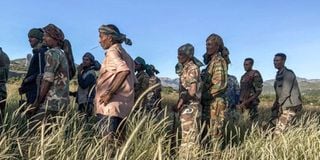Premium
TPLF crackdown: Ethiopia denies targeting civilians

Amhara militia men, who combat alongside federal and regional forces against northern region of Tigray, receive training in the outskirts of the village of Addis Zemen, north of Bahir Dar, Ethiopia, on November 10, 2020.
What you need to know:
- The Emergency Task Force on Tigray said the country’s military has been conducting “precision” operations targeting fighters’ camps only.
- Addis Ababa confirmed launching aerial strikes on the region on Monday but said it targeted areas outside the town.
The Ethiopian government has refuted claims it is targeting civilians in the ongoing crackdown on fighters of the Tigray People’s Liberation Front.
In a statement issued in Addis Ababa on Tuesday, the Emergency Task Force on Tigray said the country’s military has been conducting “precision” operations targeting fighters’ camps only.
The task force responded to media reports on Monday night indicating Tigray’s capital, Makelle, had been attacked and civilian sites bombed.
Addis Ababa confirmed launching aerial strikes on the region on Monday but said it targeted areas outside the town.
“Claims stating civilians were attacked in the process are false,” said task force spokesperson Redwan Hussein.
“The ENDF [Ethiopian National Defense Forces] rule of law operations, since TPLF launched an attack on the northern command, have avoided cities and towns to avoid civilian casualties.”
Bus attack
Meanwhile, dozens of people were on Saturday killed in an attack on a passenger bus from Wenbera to Chagni town in Ethiopia's Benishangul-Gumuz state.
In a statement, the Ethiopian Human Rights Commission (EHRC) said the attack was by unknown armed men, on the same day Ethiopian authorities detained 14 men suspected members of terror groups Al-Shabaab and Isis.
"Militants stopped a bus carrying a large number of people and killed at least 34 people," EHRC Commissioner, Dr Daniel Bekele, said.
An unspecified number of people survived, he said, but noted the number of casualties could rise.
"This attack is a tragedy that is costing us lives" Dr Daniel said, further stressing a need for coordinated measures among security and justice bodies in the region.
"Federal, regional security and justice agencies must work with the local community to devise a new regional security strategy that can stop these attacks.”
He commended government security forces for immediately acting against the bus attack.
The full extent of the damage and the results of the counter measures remained unclear.
Other attacks
Earlier on Saturday, a resident was killed and two police officers and a district administrator wounded in a shootout in Yamp Kebele, Debate Woreda area of Metekel Zone, the region's communications chief told BBC Amharic.
"The area was previously stable," he said, adding militants had invaded it and were threatening residents.
Regional authorities said attacks on civilians continued in Benishangul-Gumuz, adding that "better coordination" by federal and regional security forces was needed to prevent similar incidents.
Since August, a number of killings and attacks by militants have taken place in various parts of the region.
Regional and federal security forces have previously taken a series of actions against the militants, killing and arresting dozens of them.
Residents have been concerned about growing attacks by unidentified militants, referred to as "anti-peace" forces by regional authorities.
As a result, it was decided a few months ago that some districts of the region be administered by a command post run by security organs.
Dam project
Benishangul Gumuz, a state bordering Sudan, is where Ethiopia is building a mega dam along the Nile River.
Downstream countries, particularly Sudan and Egypt, fear the multi-billion dollar Grand Ethiopian Renaissance Dam, which would be Africa's largest, could eventually diminish their historic share of water from the Nile River.
Ethiopia, source of 85 per cent of the world's longest river, argues that the dam won't result in any significant harm to the countries.
Despite years-long running negotiations on the water dispute, Ethiopia, Sudan and Egypt have not yet reached a final agreement on contentious issues - water filling and annual dam operations.






